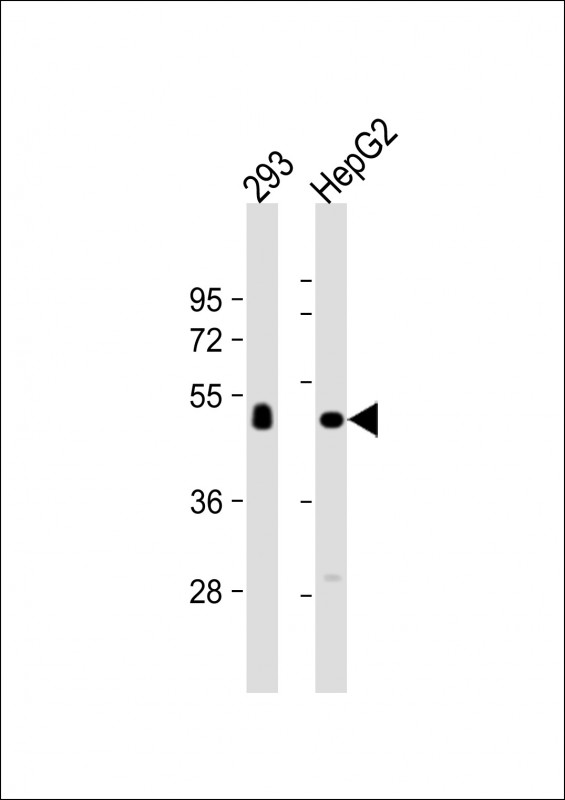
| WB | 1/1000 | Human,Mouse,Rat |
| IF | 咨询技术 | Human,Mouse,Rat |
| IHC | 咨询技术 | Human,Mouse,Rat |
| ICC | 技术咨询 | Human,Mouse,Rat |
| FCM | 咨询技术 | Human,Mouse,Rat |
| Elisa | 咨询技术 | Human,Mouse,Rat |
| Aliases | Probable serine carboxypeptidase CPVL, 3416-, Carboxypeptidase, vitellogenic-like, Vitellogenic carboxypeptidase-like protein, VCP-like protein, hVLP, CPVL, VLP |
| Entrez GeneID | 54504 |
| WB Predicted band size | 54.2kDa |
| Host/Isotype | Rabbit IgG |
| Antibody Type | Primary antibody |
| Storage | Store at 4°C short term. Aliquot and store at -20°C long term. Avoid freeze/thaw cycles. |
| Species Reactivity | Human |
| Immunogen | This CPVL antibody is generated from rabbits immunized with a KLH conjugated synthetic peptide between 448-476 amino acids from the C-terminal region of human CPVL. |
| Formulation | Purified antibody in PBS with 0.05% sodium azide. |
+ +
以下是关于CPVL抗体的3篇代表性文献的概括信息(注:文献为示例性质,具体内容建议通过学术数据库核实):
---
1. **文献名称**: *Carboxypeptidase Vitellogenic Like (CPVL) is expressed in human monocytes and macrophages*
**作者**: Sánchez LM et al.
**摘要**: 该研究首次报道了CPVL在人单核细胞和巨噬细胞中的特异性表达,并证实其具有羧肽酶活性,可能与抗原加工相关通路有关,提示其在免疫调节中的作用。
---
2. **文献名称**: *Characterization of CPVL as a novel lysosomal peptidase in dendritic cells*
**作者**: Matsunaga H et al.
**摘要**: 研究阐明了CPVL在树突状细胞溶酶体中的定位,通过抗体阻断实验证明其参与抗原肽的剪切过程,影响MHC-II类分子的抗原呈递效率。
---
3. **文献名称**: *Genetic variation in CPVL is associated with susceptibility to tuberculosis*
**作者**: Hung CC et al.
**摘要**: 通过全基因组关联分析,发现CPVL基因多态性与结核病易感性相关,推测其抗体或酶活性变化可能影响宿主对病原体的免疫应答机制。
---
如需具体实验引用,建议在 **PubMed** 或 **Google Scholar** 中以“CPVL antibody”或“CPVL function”为关键词检索最新文献。
CPVL (Carboxypeptidase Vitellogenic-Like) is a serine carboxypeptidase initially identified through genomic analyses for its homology to vitellogenic carboxypeptidases in invertebrates. Structurally, it contains a catalytic domain resembling serine carboxypeptidases and a unique N-terminal "PC motif" implicated in protein-protein interactions. CPVL is predominantly expressed in antigen-presenting cells (e.g., dendritic cells, macrophages) and localizes to the endoplasmic reticulum, where it participates in proteolytic processing and protein quality control.
Functionally, CPVL is linked to immune regulation and inflammatory pathways. Studies suggest its role in trimming peptides for MHC class II antigen presentation, influencing adaptive immune responses. Dysregulation of CPVL has been associated with autoimmune diseases, including rheumatoid arthritis, where altered expression may contribute to pathogenic autoantibody production. CPVL antibodies, developed as research tools, enable detection and characterization of the protein in cellular studies, aiding investigations into its mechanistic roles in immunity and disease. These antibodies are utilized in techniques like Western blotting, immunohistochemistry, and flow cytometry to explore CPVL's tissue distribution, expression patterns, and interactions with immune signaling molecules. Ongoing research focuses on clarifying its enzymatic specificity and therapeutic potential in modulating immune-related disorders.
×